|
Coronavirus remains the 'sci-fi alien bug' which all international governments
are uniting to overcome, and the
ban on public meetings effectively continues, - nothing much again in normal Surrey Vintage Vehicle Society gatherings. We have therefore encouraged all
our members to take
photographs instead of any of their allowable machinery and share them on
our website. Many of our
Members are of the 'elderly variety' so were hankered deep down thinking of
survival rather than escape, but some have been 'socially cycling' and
have sent photos to
us. The cycling theme continues but cars seem to be returning! We await the alien mother ship to lift the
black cloud from over all of the globe and give us a ray of golden sunshine! Independence
Day! PHOTOS WELCOME !!
Our Membership Secretary Chas Moody
apart from being keen vintage car owner is also a very keen 'two-wheels man'. As
well as having a 1914 Triumph TT Roadster Motorcycle (
Virtual 81st Pioneer Motorcycle Run - 2020 ) he is also a
regular 'modern' sports biker, and he has a broken leg to prove it, - he is also
a collector of old bicycles. A number of his cycling adventures during the
Corona Lockdown have already been covered in these pages. Chas is also a convert
to photography and has now sent some lovely photos to prove it. This cycle ride
he describes as "Shops Open Ride" following Business Secretary Alok
Sharma's announcement that all retail shops, which were forced to close to
restrict the spread of Corovavirus, could re-open. Chas writes:
"Resisting the urge to dash over to Bluewater to pick up all those
Oh-so-Essential 'non-essential' items we have all been desperately wanting since
the start of lockdown, such as...err, give me an hour and I might think of
something, I decided to cycle into Oxted to bank a few SVVS membership renewal
cheques at Barclays and have a look round to see what effect this announcement
would have on the previously almost deserted high streets of Station Road East
and West.
 
 Please
Click on the thumbnail photos to see the FULL SIZE picture Please
Click on the thumbnail photos to see the FULL SIZE picture
What better cycle could one use for a shopping trip than a 1977 Dawes 'Kingpin'
folding shopper bike with 20" wheels. The Kingpin was introduced in 1964 in
competition to the revolutionary small-wheeled Moulton bicycle and then the
balloon-tyred Raleigh RSW 16 which was introduced in 1965. It is easy to ride
although rather heavy and has a Sturmey Archer three speed. A removable basket
at the front and a high quality cast aluminium luggage rack at the rear make it
ideal for small items of shopping. The frame is hinged in the middle with a
quick-release locking mechanism which, together with telescopic seat and
handlebar stems, allow the machine to be reduced in size sufficiently to fit in
a car boot (photo below left). The Dawes Kingpin is still on the market in 2020,
although vastly different to the older model (photo below right).



With the banking completed it was time to have a look round Oxted town centre,
much of which was developed as a result of the coming of the railway in 1884. A
distinctive feature of many of the buildings is the 'Oxted Mock Tudor' style
built in the early 1900's by a family firm named Williams who came from
Australia. Their buildings incorporate almost every possible Tudor device and
are extremely well built. Caxton House in Station Road West being a good
example,
 
 Please
Click on the thumbnail photos to see the FULL SIZE picture Please
Click on the thumbnail photos to see the FULL SIZE picture
Proceeding to Station Road East on the other side of the railway line we find
the bronze plaque which marks the Greenwich Meridian built into the wall below
the front window of Paydens Pharmacy. The Meridian is a line of longitude
north/south to the poles going through Greenwich and is called the Prime
Meridian. This was the origin in 1884 of 'mean solar time'at the Royal
Observatory in Greenwich (GMT : Grenwich Mean Time). In 1984, the National
Maritime Museum arranged for the Enfield Foundry to cast a bronze plaque to
commemorate the ‘centenary’ of the Prime Meridian. At the time, it was
stated that they would only be produced if 20 or more orders were received. How
many were made is unknown, the foundry’s records having been destroyed. Four
have been located to date.
 
One outstanding feature of the Oxted skyline which was long considered a blot on
the landscape was the gas holder in the middle of the town which has now been
demolished to make way for the building three apartment blocks comprising 111
flats, to be completed some time next year. More buildings of the 'Oxted Mock
Tudor' style are on this side of the railway but note the lack of shoppers on
this first day of 'non-essential' shopping.
 
 Please
Click on the thumbnail photos to see the FULL SIZE picture Please
Click on the thumbnail photos to see the FULL SIZE picture
Many of the shops were still not open including the charity shops, barbers,
hairdressers, opticians, etc. so it appears that the good people of Oxted had
not indulged in a frenzy of shopping mania - or perhaps they'd all gone to
Bluewater!
 
Oxted appears in the Domesday Book of 1086 as Acstede, meaning 'Place where oaks
grew'. The chief crops grown were wheat, oats, grass, roots and hops and most of
the inhabitants were employed in agriculture. The original village of Oxted (now
Old Oxted) is a number of houses centred on a short high street with four pubs
(The Old Bell, The George Inn, The Crown Inn and The Wheatsheaf), a short bypass
lane just off the A25. Oxted's oldest church, St Mary's, was built in a field
north-east of the medieval heart of Oxted, near Master Park and the railway
station. The Grade I listed church dates from at least Norman times and stands
on a conspicuous mound. With the arrival of the railway in 1884 Oxted boomed in
line with London's trade growth around its station, and new buildings created
"New Oxted". These new buildings were built in the Tudor style,
particularly with stucco frontages
Yet others prefer the exercise to be
done by their engines rather than their feet. A group of old-timers, SVVS
members Andrew Randall, Michael Harwood, Paul
Devitt & John Worrell, took their cars to
Penshurst Place encouraged by free parking in beautiful surroundings, and a
useful take-away cafe. This is a place the SVVS last visited for the
Summer Saunter in 2013. Very chequered history: The present manor
house was built in 1341 for a London merchant and four times Lord Mayor of
London who wanted a country residence within easy distance of London. This was
at the time when such properties ceased to be castles: they were more dwellings
that could be defended in an emergency.
 
A subsequent owner Edward Stafford, 3rd Duke of Buckingham was executed
in 1521 by King Henry VIII following a lavish feast held at Penshurst Place
hosted by the Duke in honour of Henry. Henry then used Penshurst Place as a
hunting lodge, being only a few miles from Hever Castle, childhood home of Anne
Boleyn. In 1550, Henry VIII's son, King Edward VI, granted the house and estate
to Sir Ralph Fane but it was forfeited two years later after Sir Ralph was
executed for treason. By the 19th century, the building was falling into
disrepair, - but a new occupant in 1818 began to restore it.


One enters the house through the enormous Baron's Hall, complete with original
open beamed vaulted roof, central open fire place and lack of any other form of
heating. On a very hot day, it was a cool haven; in winter it is said that a
chicken does not thaw. From the Baron's Hall the dining room, still used for
large family occasions (and was originally retired to by the ladies when things
became too hectic downstairs) leads to a series of family rooms with furnishings
collected by the Sidney family over the generations. Penshurst proved to be a
magnificent yet homely dwelling, set in a formal garden with some welcome shady
trees and Garden tea room.

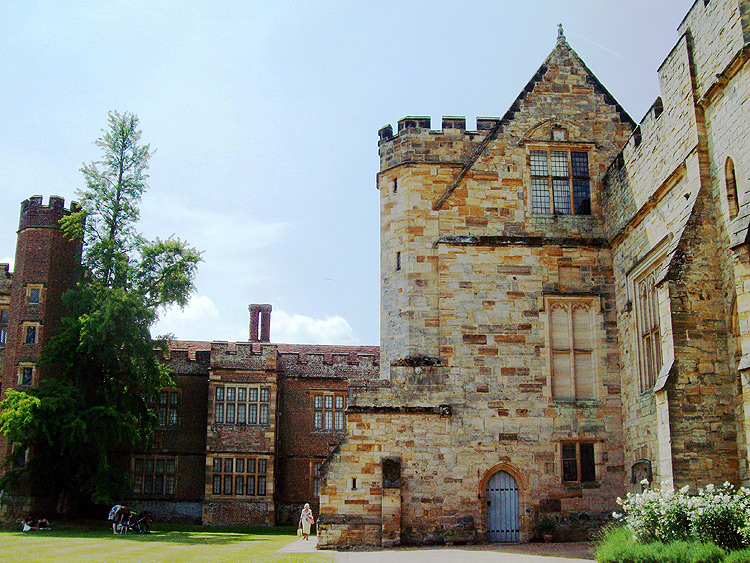
 Please
Click on the photos to see larger picture Please
Click on the photos to see larger picture
Penshurst proved to be a magnificent yet
homely dwelling, set in a formal garden with some welcome shady trees and Garden
tea room.
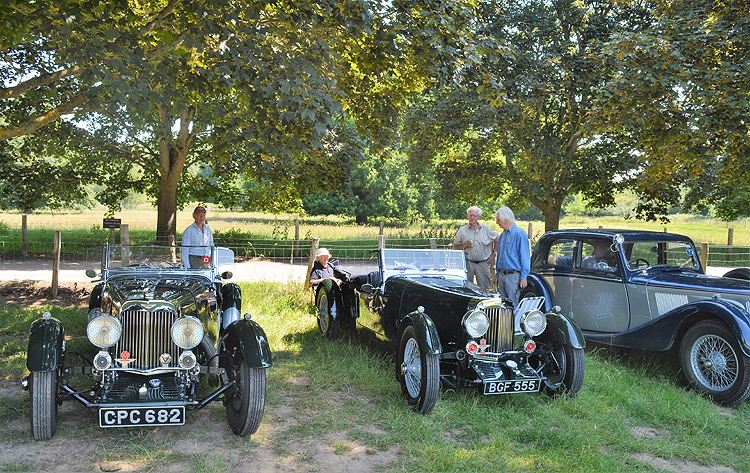
SVVS members left to right Andrew Randall, Michael Harwood, Paul Devitt
& John Worrell. On the right is the 1937 Alvis of Edmund Waterhouse,
presently a non-member -
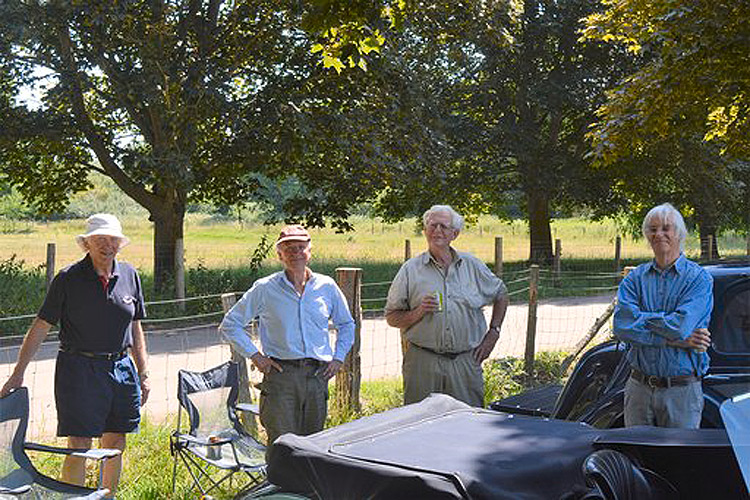
Four Musketeers: Michael Harwood, Andrew
Randall, Paul Devitt & John Worrell.-
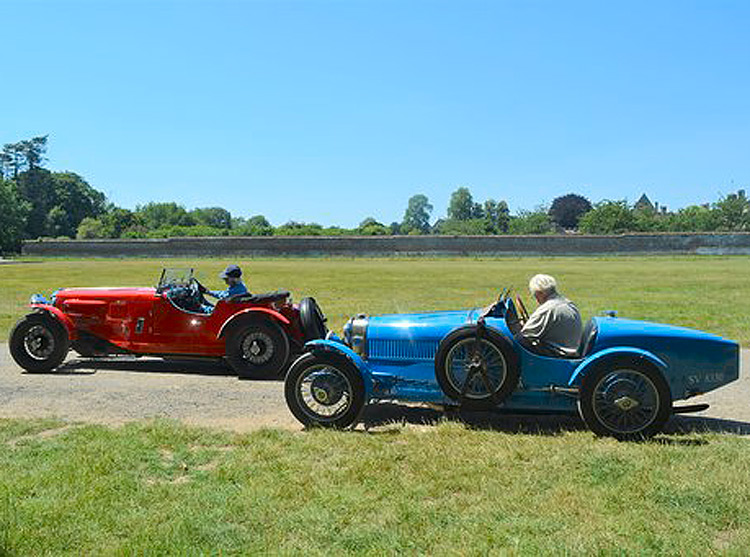
John Worrell in his 1935 Alvis Sports
Special and Paul Devitt in his 1927 Type 37 Bugatti head off to a picnic lunch
at Randall Towers
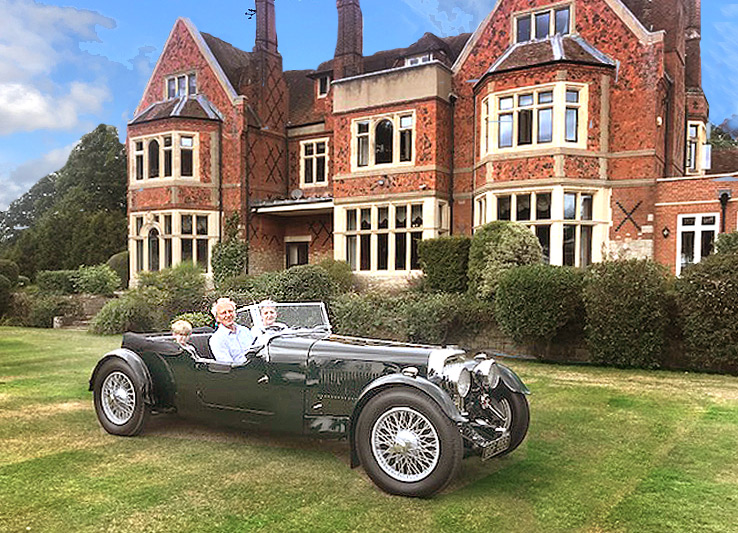
Andrew Randall in his 1934 Mk II long chassis Aston risks the gardener's wrath
doing circuits on the lawn at Sendholme, the Surrey home of his brother-in-law
Michael Cowan.
Go to Recent Venues
Page
PICTURE GALLERY INDEX
|

















